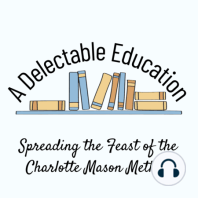37 min listen

Episode 27: Plutarch
Episode 27: Plutarch
ratings:
Length:
24 minutes
Released:
Apr 1, 2016
Format:
Podcast episode
Description
Charlotte Mason thought Plutarch an invaluable source of knowledge and moral wisdom in the subject of citizenship. This podcast explores who he was, why Mason thought so, and how the study of the lives he described would inform and enrich our children. Listen Now: If you are seeing this message, please make sure you are using the most current version of your web browser: Internet Explorer 9, Firefox, Chrome “In the same way, readings from Plutarch's Lives will afford the best preparation for the study of Grecian or of Roman history.” (Vol. 1, p. 286) “[T]he principle being, that, whenever practicable, the child should get his first notions of a given period, not from the modern historian, the commentator and reviewer, but from the original sources of history, the writings of contemporaries.” (Vol. 1, p. 285) “Perhaps nothing outside of the Bible has the educational value of Plutarch’s Lives.” (Vol. 3, p. 236) “[The Lives] stand alone in literature as teaching that a man is part of the State, that his business is to be of service to the State, but that the value of his service depends upon his personal character.” (Vol. 3, p. 280) “...an early education from the great books with the large ideas and the large virtues is the only true foundation of knowledge--the knowledge worth having.” (Vol. 6, p. 308) "We take the child to the living sources of history––a child of seven is fully able to comprehend Plutarch, in Plutarch's own words (translated), without any diluting and with little explanation." (Vol. 2, p. 278) “We read him his Tanglewood Tales, and when he is a little older his Plutarch, not trying to break up or water down, but leaving the child's mind to deal with the matter as it can.” (Vol. 2, pp. 231-232) “[Plutarch] hath written the profitable story of all authors. For all other were fain to take their matter, as the fortune of the countries whereof they wrote fell out: But this man being excellent in wit, learning, and experience, hath chosen the special acts of the best persons, of the famousest nations of the world.” (Thomas North as quoted by Mason in Vol. 6, p. 274) If you would like to study along with us, here are some passages from The Home Education Series and other Parent's Review articles that would be helpful for this episode's topic. You may also read the series online here, or get the free Kindle version from Fisher Academy. Home Education (Volume 1), pp. 286-87 School Education (Volume 3), pp. 152, 235, 280-81, 286-89 Ourselves (Volume 4), Book I, Chapter 2 Towards a Philosophy of Education (Volume 6), Book I, Section II, "Morals and Economics" Stories from the History of Rome North's Plutarch The Plutarch Primer (Publicola) Plutarch Project, Vol. 1 Plutarch Project, Vol. 2 The Children's Plutarch Plutarch retold by Weston Plutarch retold by Kaufman Ten Famous Lives (Contains affiliate links) Stories from the History of Rome (free online) Anne White's Study Guides (free online--scroll down to individual Lives listings) The Children's Plutarch (free online) Weston's Plutarch (free online) Kaufman's Plutarch (free online)
Released:
Apr 1, 2016
Format:
Podcast episode
Titles in the series (100)
Episode 26: Charlotte Mason, Food for Mothers: Charlotte Mason's education is not just for children. This podcast is a discussion of three mothers who have found that Mason has influenced them in ways they never could have dreamed when they took up her methods. Listen to discover all the ways the del by A Delectable Education Charlotte Mason Podcast